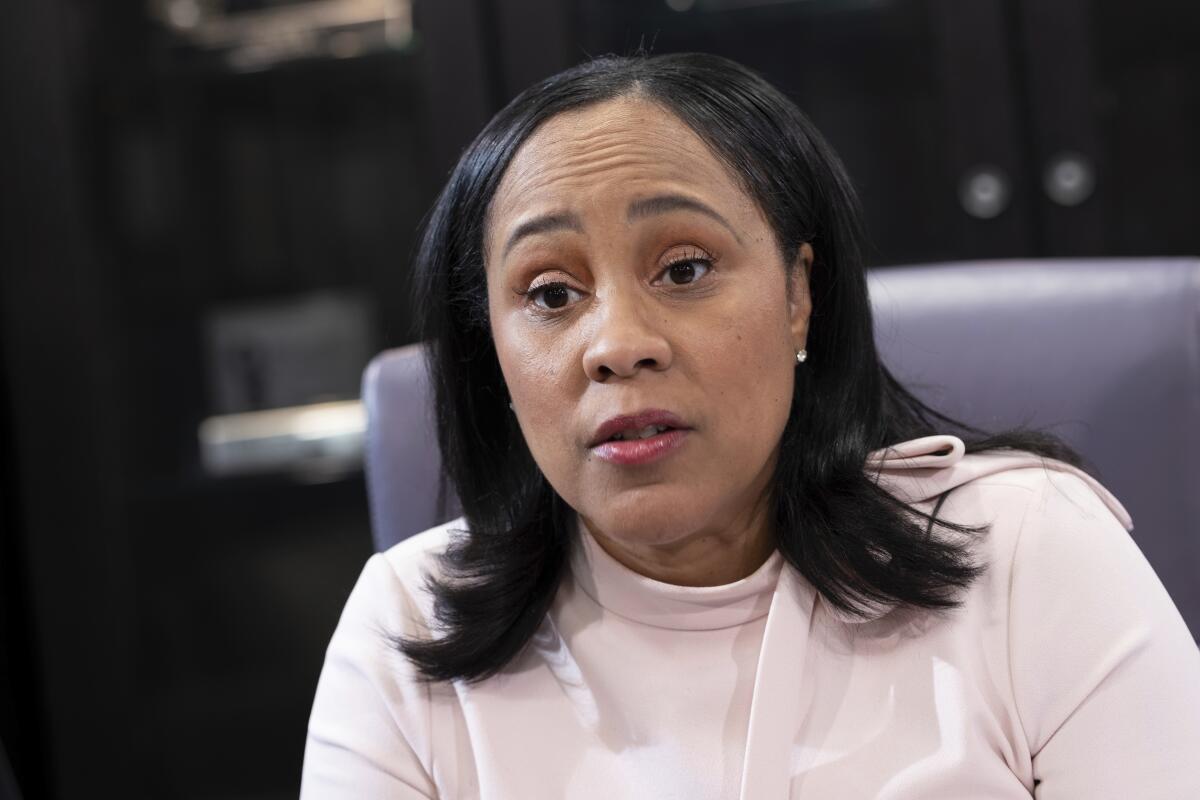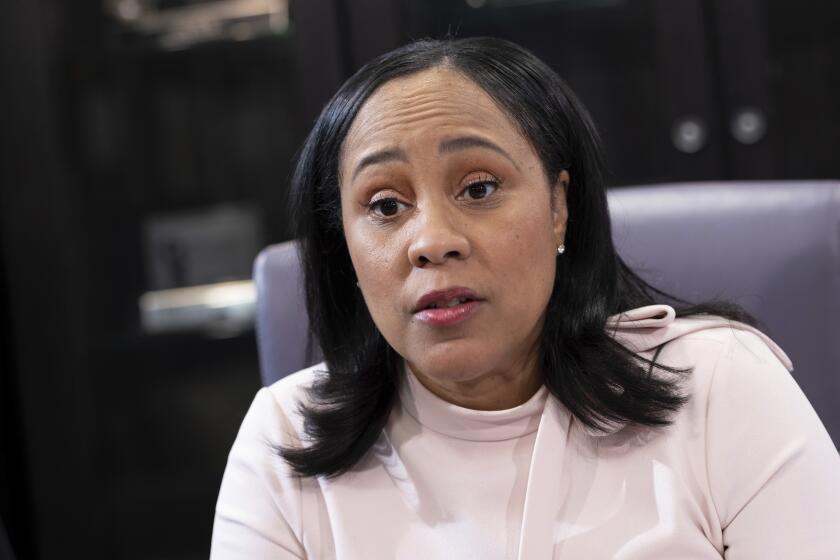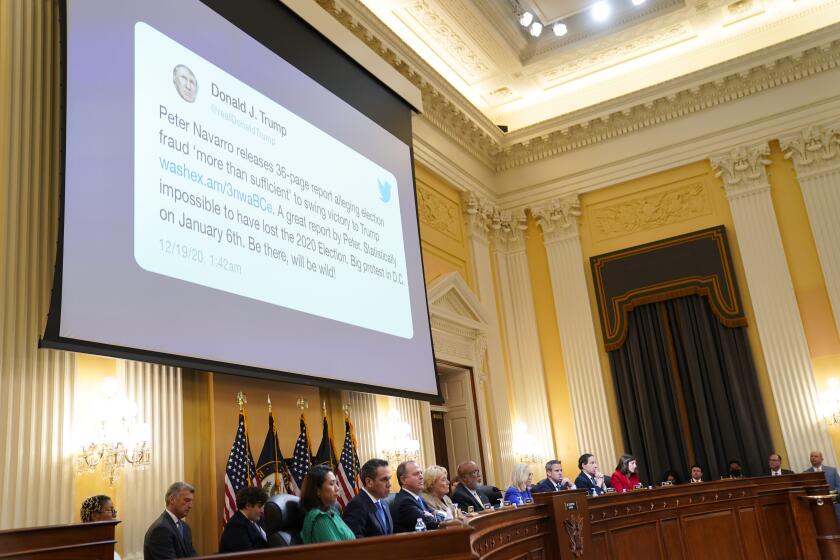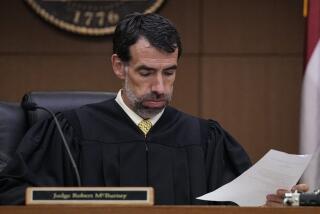Fake electors in Georgia may face charges in election probe

- Share via
ATLANTA — The Georgia prosecutor who is investigating whether former President Trump and others illegally interfered in the 2020 general election in the state has informed 16 Republicans who served as fake electors that they could face criminal charges.
They all signed a certificate declaring falsely that Trump had won the 2020 presidential election and declaring themselves the state’s “duly elected and qualified” electors, even though Joe Biden had won the state and a slate of Democratic electors was certified. Eleven of the fake electors filed a motion Tuesday to quash their subpoenas, calling them “unreasonable and oppressive.”
Also Tuesday, Sen. Lindsey Graham (R-S.C.) agreed to file any challenges to a subpoena in the investigation in either state superior or federal court in Georgia, according to a court document. He had previously filed a motion in federal court in South Carolina trying to stop any subpoena from being issued to him there on behalf of the prosecutor in Georgia.
A special grand jury investigating Trump’s efforts to undermine the election has subpoenaed seven allies of the former president.
Fulton County Dist. Atty. Fani Willis last year opened a criminal investigation “into attempts to influence the administration of the 2020 Georgia General Election.” A special grand jury with subpoena power was seated in May, at her request. In court filings this month, she alleged “a multi-state, coordinated plan by the Trump Campaign to influence the results of the November 2020 election in Georgia and elsewhere.”
Willis’ office declined to comment Tuesday on the motion to quash the subpoenas.
A lawyer for Willis’ office said in a court filing Tuesday that each of the 16 people who signed the false elector certificate has received a letter saying they are targets of the investigation and that their testimony before the special grand jury is required.
In the motion to quash the subpoenas, lawyers for 11 of the fake electors said that from mid-April through June, Willis’ office told them they were considered witnesses, not subjects or targets of the investigation. For that reason, they agreed to voluntary interviews with the investigative team, the motion says. Georgia Republican Party Chairman David Shafer and another of the fake electors appeared for interviews in late April.
The committee is gradually revealing the evidence it has collected about President Trump’s plan to overturn the 2020 presidential election.
On June 1, grand jury subpoenas were sent to all 11 of those fake electors. On June 28, the district attorney’s office for the first time told the fake electors’ lawyers that their clients were considered targets, rather than witnesses, the motion says.
On Dec. 14, 2020, when Georgia’s official Democratic electors met to certify the state’s electoral votes for Biden, the fake Republican electors met to certify a slate of electoral votes for Trump. They did so, the motion says, because there was a pending lawsuit challenging the election results, and if a judge found that Trump had won, their electoral slate would become valid. The district attorney’s office knew this and properly labeled the fake Republican electors as witnesses, prompting them to agree to voluntary cooperation, the motion says.
“The abrupt, unsupportable, and public elevation of all eleven nominee electors’ status wrongfully converted them from witnesses who were cooperating voluntarily and prepared to testify in the Grand Jury to persecuted targets of it,” the motion says. As a result, their lawyers advised them to invoke their federal and state rights protecting them against self-incrimination, and they “reluctantly” accepted that advice, the motion says.
Their lawyers assert that the change in status to targets was based on “an improper desire to force them to publicly invoke their rights as, at best, a publicity stunt.” Therefore, they should be excused from appearing before the special grand jury, the motion says.
The motion asks Fulton County Superior Court Judge Robert McBurney, who is overseeing the special grand jury, to excuse the 11 electors from appearing before the panel and to look into Willis’ actions “indicating the improper politicization of this investigatory process.”
It also asks him to grant a motion filed Friday by state Sen. Burt Jones seeking to remove Willis and her office from the investigation. Jones, the Republican nominee for lieutenant governor, alleged that the investigation is politically motivated because Willis is an active supporter of his Democratic opponent. McBurney on Tuesday set a hearing on that motion for Thursday.
Willis’ office has said Jones’ claims are without merit; a lawyer representing the office wrote in a filing Tuesday that Jones has identified no actions that show political motivation.
More to Read
Get the L.A. Times Politics newsletter
Deeply reported insights into legislation, politics and policy from Sacramento, Washington and beyond. In your inbox twice per week.
You may occasionally receive promotional content from the Los Angeles Times.












